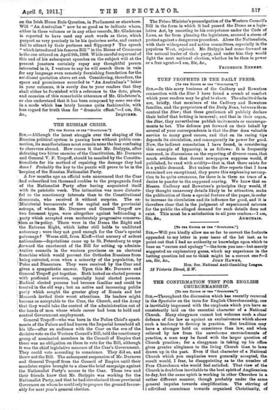THE RUSSIAN CRISIS.
[To TER EDITOR OF Tin "SPECTATOR"] SIR,—Although the latest struggle over the shaping of the Russian political system is passing here without public com- motion, its manifestations must remain none the less confusing to observers abroad. How comes it that Mr. Stolypin, after defeating two bitter enemies of the Constitution, Mr. Durnovo and General V. E. Trepoff, should be assailed by the Constitu- tionalists for his method of repairing the damage they had done ? Probably the key to the puzzle will prove to be in the `keeping of the Russian Nationalist Party.
A few months ago an official note announced that the Czar had subscribed ten thousand roubles to the propaganda fund of the Nationalist Party after having acquainted itself with its patriotic work. The intimation was more distaste- ful to the reactionary interests than to the Constitutional `democrats, who received it without surprise. The ex- 'Ministerial bureaucrats of the capital and the provincial satraps, of whom Mr. Durnovo and General Trepoff are two foremost types, were altogether against befriending a party which accepted even moderately progressive conserva- Itism as its policy. There were in the Duma, the Right and the Extreme Right, which latter still holds to undiluted autocracy : were they not good enough for the Czar's special patronage ? Worse still, from Kieff—that nursery of ardent nationalism—deputations came up to St. Petersburg to urge -forward the enactment of the Bill for setting up adminis- trative councils in the western provinces on an electoral franchise which would prevent the Orthodox Russians from being outvoted, even when a minority of the population, by Poles and Dissenters. They were received by the Czar and given a sympathetic answer. Upon this Mr. Durnovo and General Trepoff got together. Both looked on elected persons with profound aversion, especially loyal elected persons. Radical elected persons had become familiar and could be I treated in the old way ; but an active and increasing public party which sought the greater glory of Russia and her Monarch invited their worst attentions. Its leaders might become so acceptable to the Czar, the Church, and the Army that they would take the control of the administration out of the hands of men whose whole career had been to hold and control Government employment.
General Trepoff—who was born in the Police Chief's apart- ments of the Palace and had known the Imperial household all his life—after an audience with the Czar on the eve of the decisive vote on the Western Council's Bill, told the reactionary group of nominated members in the Council of Empire that there was no obligation on them to vote for the Bill, although it was the chief legislative measure of the Czar's Government. They could vote according to conscience. They did so, and threw out the Bill. The subsequent suspension of Mr. Durnovo and General Trepoff from the Council of Empire until their mandates expire brought to a close the brief campaign against the Nationalist Party's access to the Czar, These two and their friends knew that Mr. Stolypin was working for the Nationalist Party, and that he had circularised those provincial Governors on whom he could rely to prepare the ground favour- ably for next year's general election. The Prime Minister's promulgation of the Western Council's Bill in the form in which it had passed the Duma as a legis- lative Act, by resorting to his competence under the Code of Laws, so far from pleasing the legislators, aroused a storm of protest against a dangerous precedent. Alone the Nationalists, with their widespread and active committees, especially in the populous West, rejoiced. Mr. Stolypin had come forward as the natural leader of their party, and under him they would fight the next national election, whether he be then in power or a free agent.—I am, Sir, &e., FREDERICK RENNET.










































 Previous page
Previous page